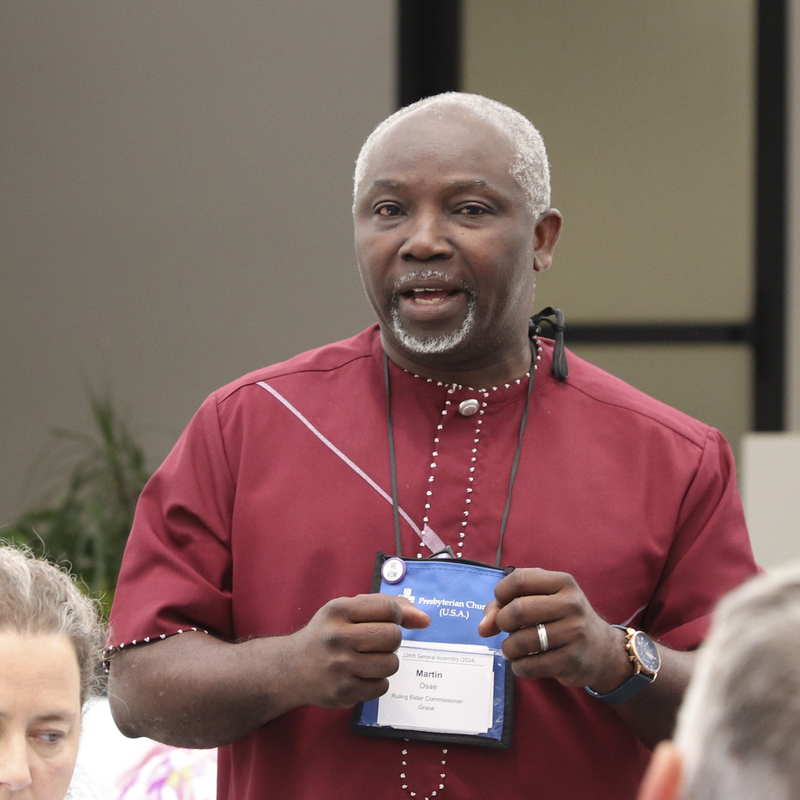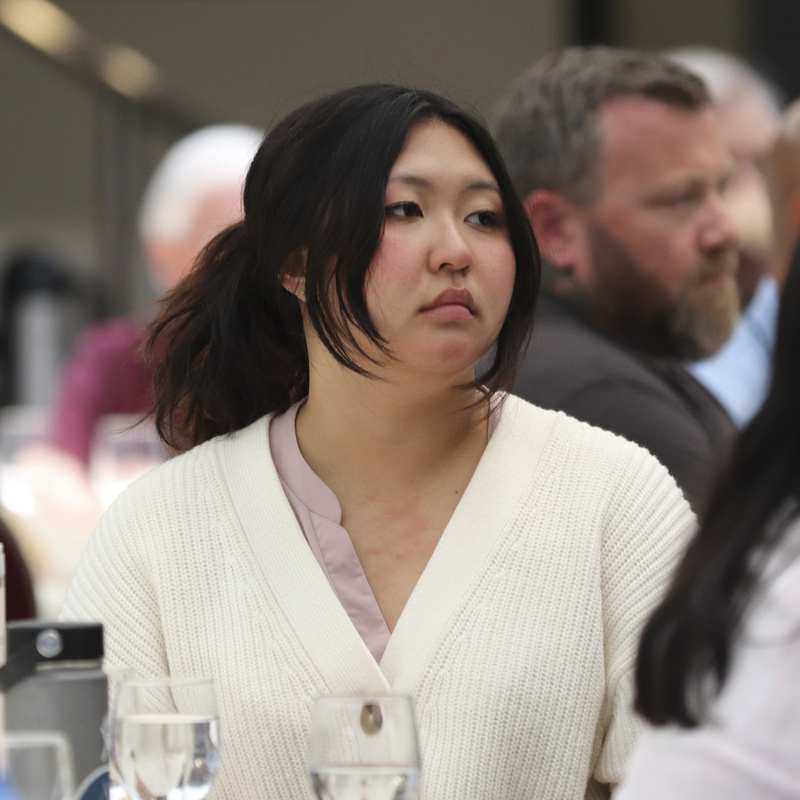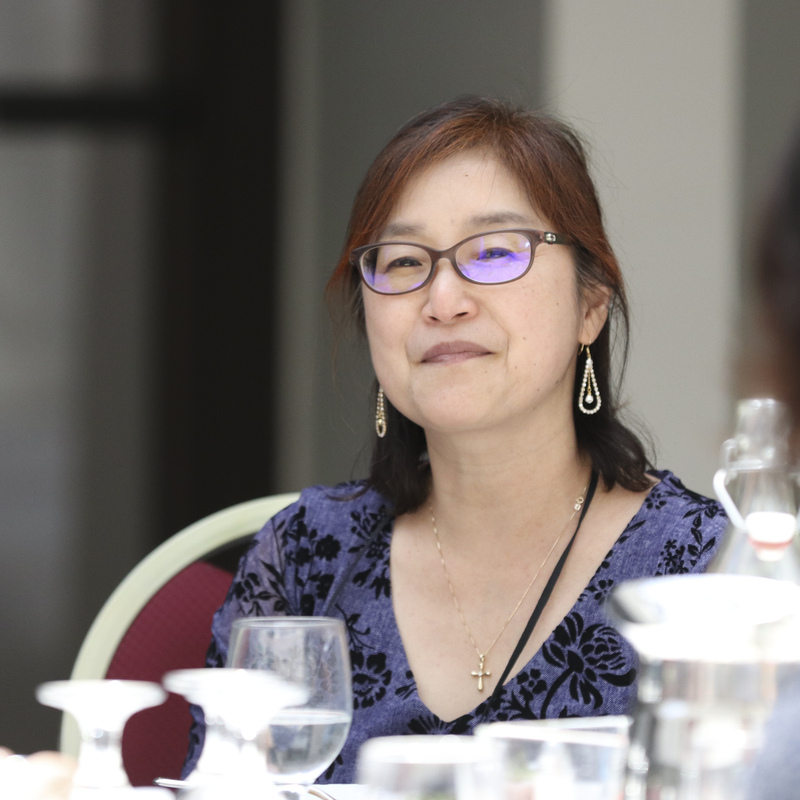
Rev. Martin Osae, a new worshiping community leader is a ruling elder commissioner, Grace Presbytery. Photo by Kristen Gaydos

Rev. Martin Osae, a new worshiping community leader is a ruling elder commissioner, Grace Presbytery. Photo by Kristen Gaydos
“I often say if you’re not around the table, you are ON the table,” said Martin Osae, a ruling elder commissioner at the 226th General Assembly from Grace Presbytery. Osae is glad to give voice to the growing immigrant fellowships and churches. On Sunday evening, he spoke up during the assembly’s interviews of the co-moderator candidates.
“I wanted to be sure the co-moderators knew and understood the growth that is happening,” said Osae. He asked how each would support the “growth trajectory that is happening in immigrant congregations and new worshiping communities.”
New worshiping community leaders and members are attending the 226th General Assembly to lend their voice and vote to the governance of the PC(USA) as commissioners, a Young Adult Advisory Delegate, and a journalist with the Presbyterian-Outlook. A lunch on Tuesday at GA celebrated that in the eight years since 1001 New Worshiping Communities began its work supporting innovative approaches to ministry, 800 new worshiping communities have been launched and supported by the PC(USA). Their leaders are diverse in background and their sense of call. Some are previously ordained as teaching elders, some are ruling elders, while others are still discerning their relationship to formal certification within the PC(USA).
Osae has been leading a new worshiping community of Ghanian immigrants for eight years which is nested inside Woodhaven Presbyterian Church of Irving, Texas. He was born and raised Presbyterian but has ministered in Assemblies of God contexts as well. About six years ago, he became a commissioned ruling elder after taking certified ministry courses at Austin Presbyterian Theological Seminary. He immediately began to participate in presbytery committees and meetings and embraced the change to serve at General Assembly.
Osae served on the Environmental and Climate Justice Committee and supported ENV-02’s call to divest from fossil fuel companies because poor communities suffer the most from fossil fuels and damage to the climate. “Just last week, I received a video from my home country, Ghana, of flooding in a neighborhood that has never flooded in its history. Our climate is changing,” said Osae, also a full-time science educator in the local schools.
Osae is grateful to be “around the table” because as an immigrant and new worshiping community leader, his experience is “on the table” through overtures relating to ordination standards (ORD-06, ORD_07, ORD-08), shared ecumenical ministry (ECU-06) and the examination of ordination candidates (POL-01).

Dylan So, member of the new worshiping community, Anchor and Hope in San Diego, California, participates in the 226th General Assembly as a YAAD. Photo by Kristen Gaydos

The Rev. Grace Kim, “lead honker” of a new worshiping community in Appalachia is a teaching elder commissioner at the 226th General Assembly. Photo by Kristen Gaydos
“Imagine all the learning from each other, our different cultures, if we are a little bit more flexible in the polity to embrace and allow people to come into leadership and access training resources,” said Osae.
Osae echoed ECU-06’s call to be “flexible” in our approach to shared ministry with ecumenical partners — particularly those in the World Communion of Reformed Churches, which may hold more conservative convictions than the PC(USA) and prepare their ministers differently. “Inclusion will be the key word for me — that all are included,” he said. “If we keep our doors closed, then we only know what we know, and we don’t learn from each other.” Osae wondered, “how can we still maintain fellowship and relationship as we learn from each other?”
The Rev. Grace Kim, a teaching elder commissioner from Abingdon Presbytery, has been the “lead honker of Wild Goose Christian Community since 2019. Kim grew up Presbyterian in Korea and immigrated to the U.S. in 1999 for her graduate studies. She joined a PC(USA) church and graduated from Union Presbyterian Seminary. When she was ordained in 2014, she served in a traditional congregational setting before answering the call to lead a new worshiping community in the Appalachian region of Virginia. In this ministry context very different than her cultural upbringing, Kim describes the posture of learning she must take in order to effectively serve others different than her on many levels. The Rev. Nikki Collins, manager of the 1001 New Worshiping Communities movement, wonders “if the posture of learning that Kim exhibits might be a model for the PC(USA) as a whole.”
“I wanted to be a commissioner to experience the PC(USA) as the whole picture,” said Kim, who admits alongside other 1001 NWC leaders that in the past she has focused on differentiating from traditional churches. Now she feels “it is time for 1001 NWC and traditional churches to work together as mutual partners to learn from each other.” Kim came to General Assembly “to learn ways for NWCs to contribute to the whole church of PC(USA).”
“I come to see the complexity of the GA work and how diverse we are as the church,” said Kim, who has appreciated “the importance of communicating clearly and effectively, in a large assembly like GA.”
“Through this GA, I realize once again that we are living in a fast-changing period in the life of the church and society,” Kim said.
